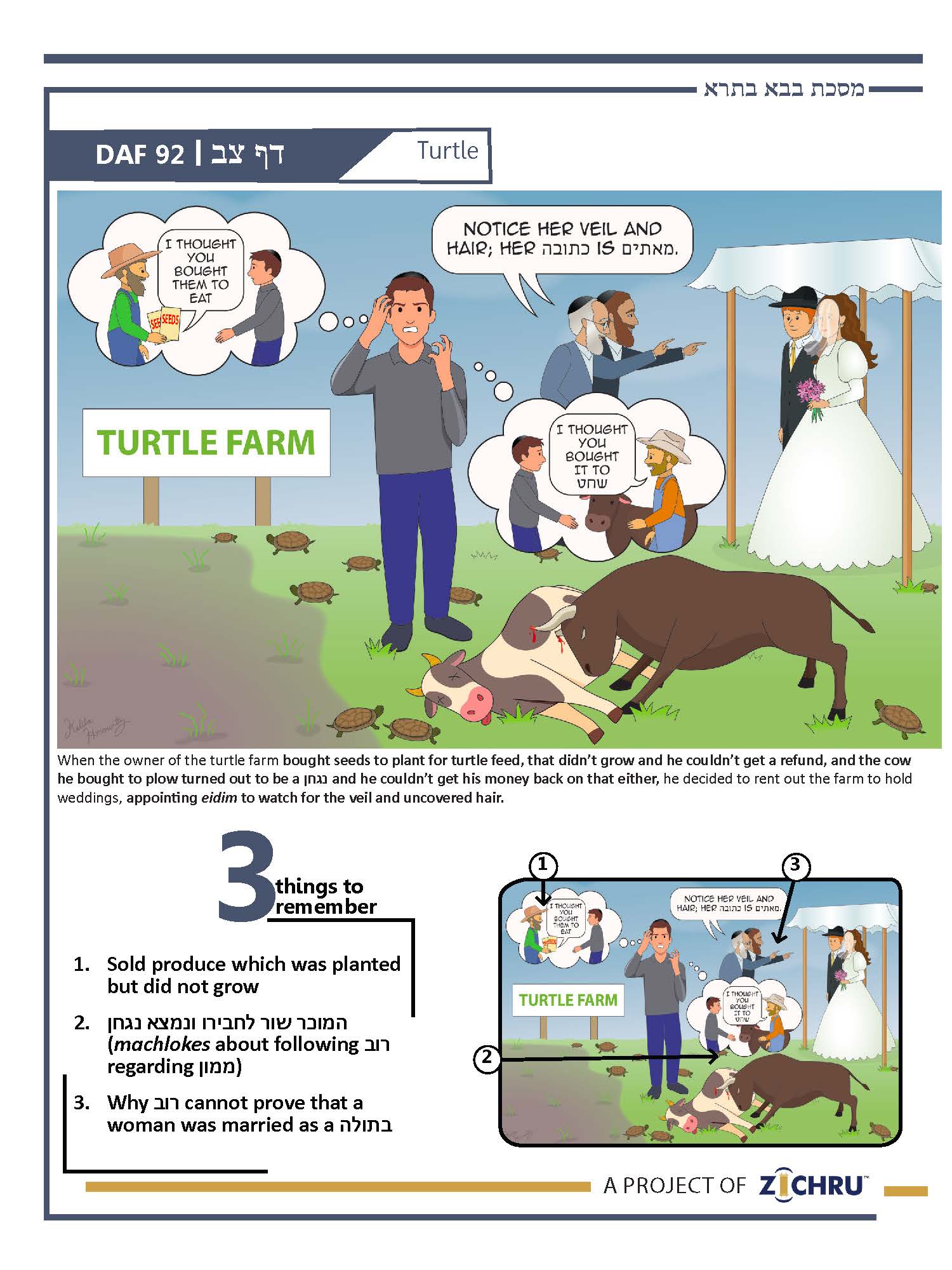Bava Basra - Daf 92
- Audio Timestamps
0:00 - The 3 Sugyos
2:43 - Review of 3 Sugyos
5:12- Siman
8:03 - 4 Blatt Back Chazarah
15:06 - Pop Quiz (Last 7 blatt)
For access to all Zichru resources including PDFs, and illustrations CLICK HERE
- Sold produce which was planted but did not grow
The sixth Perek begins: המוכר פירות לחברו – if one sells produce to his friend, and did not indicate if they were for planting or eating, וזרען ולא צמחו – and [the buyer] planted them, but they did not grow, even if it was flaxseed (which is generally purchased for planting), אינו חייב באחריותן – [the seller] is not responsible for them. The buyer cannot demand a refund, because the seller can claim they were sold to be eaten (even if the majority of such produce is sold for planting). Rabban Shimon ben Gamliel says: זרעוני גינה שאינן נאכלין – if he sold garden seeds, which are not eaten at all, חייב באחריותן – he is responsible for them, and must refund the buyer, since they were clearly bought for planting.
- המוכר שור לחבירו ונמצא נגחן (machlokes about following רוב regarding ממון)
The Gemara discusses: המוכר שור לחבירו – If one sells an ox to his friend, ונמצא נגחן – and it is found to be a “gorer” (i.e., prone to damaging) before the sale, and is therefore only usable for meat, and not for plowing, Rav says: הרי זה מקח טעות – this is a purchase made in error, and the buyer is refunded. Shmuel says: יכול לומר לו לשחיטה מכרתיו לך – [the seller] can say, “I sold it to you for shechitah,” for which it is fit, and the sale is valid. The Gemara asks that if this buyer generally buys oxen לנכסתא – for shechitah, we should assume that was his intent, and the sale should be valid, and if he generally buys oxen לרדיא – for plowing, we should assume his purchase was for plowing, and the sale should be void!? It answers that the case is a buyer who buys for both (i.e., a butcher who is a farmer). The Gemara ultimately explains that Rav holds: בתר רובא אזלינן – we follow the majority, ורובא לרדיא זבני – and the majority of oxen are bought for plowing, so the sale is void. Shmuel says: כי אזלינן בתר רובא – When do we follow the majority? באיסורא בממונא לא – Only regarding prohibitions, but not regarding monetary law.
- Why רוב cannot prove that a woman was married as a בתולה
The Gemara attempts to prove that we do not follow רוב for monetary law, from a Mishnah about a woman who was widowed or divorced, and she says she was married as a בתולה (and entitled to a kesubah of two hundred zuz), and he says that he married her as a widow (and she is only entitled to one hundred zuz). The Mishnah says: אם יש עדים שיצאה בהינומא וראשה פרוע – if there are witnesses that she went out from her father’s house with a veil, or that her hair was uncovered, her kesubah is two hundred, because these indicate she was a בתולה at the time. The Gemara asks that according to Rav, we should say even if there are no witnesses: הלך אחר רוב הנשים – follow the majority of women, ורוב נשים בתולות נישאות – and the majority of women marry as בתולות!? The Gemara ultimately answers that although a majority are married as בתולות, a minority are married as widows, and רוב הנישאות בתולות יש להן קול – most women who marry as בתולות are spoken about, and their marriage as בתולות is publicly known, וזו הואיל ואין לה קול – so this one, since she is not spoken about, (i.e., she had no supporting witnesses) איתרע לה רובא – the case to follow the majority is weakened.
Siman – Turtle (צב)
When the owner of the turtle farm bought seeds to plant for turtle feed, that didn’t grow and he couldn’t get a refund, and the cow he bought to plow turned out to be a נגחן and he couldn’t get his money back on that either, he decided to rent out the farm to hold weddings, appointing eidim to watch for the veil and uncovered hair.


